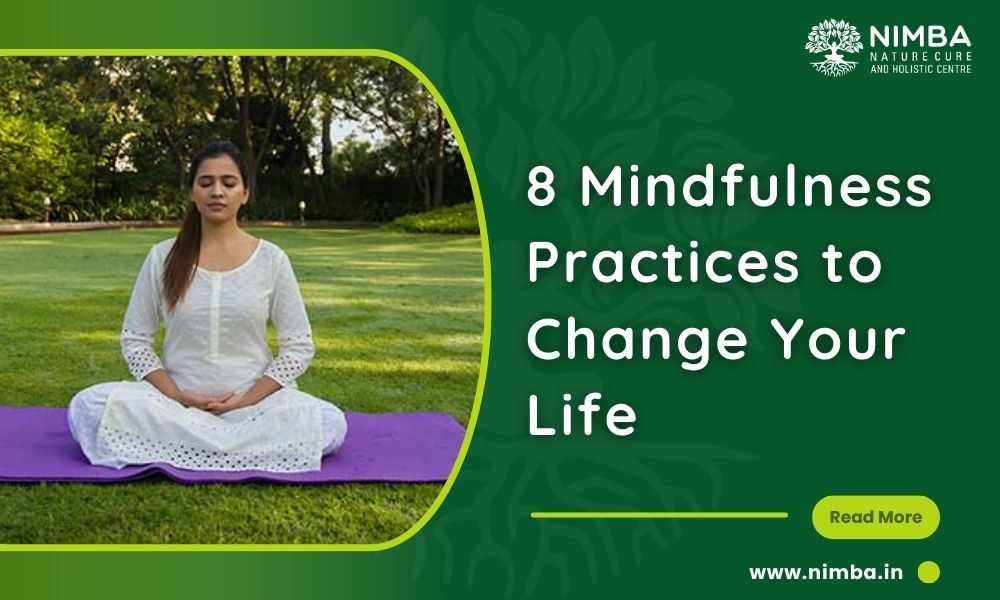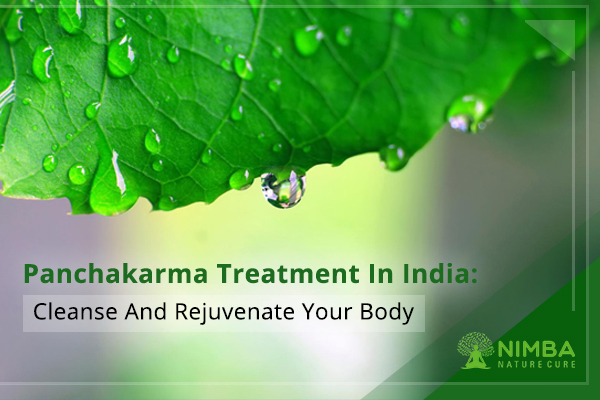8 Mindfulness Practices to Change Your Life
By: Nimba - September 9, 2024
In contemporary society people are continuously under stress, pressure, anxiety and it is very hard not to get distracted. Mindfulness is the process of being aware of the present moment and getting in touch with yourself hence can be practised as a way of taking control of your mental well-being. The need for natural wellness practice such as mindfulness that Nimba Nature Cure, the most efficient naturopathy treatment centre in Gujarat supports due to conformity to the general naturopathy approach.
In this blog, we will discuss eight such mindfulness techniques through which you can change your life and bring harmony to your mind, body and soul.
1. Mindful Breathing
These four exercises are among the easiest yet the most effective forms of mindfulness exercises ever invented. It concerns being completely mindful of your breathing – feeling the movement of your chest, the sensations in your nostrils as you breathe in and feeling the pace of the breaths you take. Therefore, when you concentrate on your breathing it helps in grounding your mind as well as reduces anxiety.
How to practise:
- Identify a convenient room, where there are no loud noises and bright lights coming in from the windows.
- Take a deep breath, hold it for a few seconds and then breathe out slowly — this is the best way to relax.
- Be aware of the feeling of breathing and simply, if your thoughts get distracted, return your focus to the breathing.
At the centre, whatever naturopathy treatments are offered to the public, mind breathing exercises are incorporated to enable them to feel or rather get to know themselves.
2. Body Scan Meditation
Body scan meditation is a practice that is used to assist the individual to be aware of the feelings of the mechanical structures of his body. It is like a ‘scan’ technique where you consciously go through every section of your body from head to toe and perceive the level of pain you are experiencing.
How to practise:
- Relax yourself and lay on your back on the ground, and ensure you close your eyes.
- Stand straight or sit with your back straight – beginning with the feet, think up through the body to your head.
- When you reach out each of the body parts, attend to the feeling and let go of the tension as you breathe out.
This practice can be particularly useful to many people especially helping to alleviate stress which is a vital aspect of the treatments offered at Nimba Nature Cure.
3. Mindful Eating
Being conscious of the food you are consuming is what is referred to as mindful eating and it is simply eating to appreciate the food. This practice makes you appreciate every meal in the best way possible with no distractions and takes time to fully appreciate the food we take.
How to practise:
- Take a seat in front of a table and do not distract yourself with anything during the meal.
- There is no need to take huge amounts of food into your mouth; it is recommended that one takes small bites of the food with a central emphasis on chewing the food slowly.
- Eschew objects such as phones, TV among others, and ensure all your senses are involved in the process of eating.
At Nimba Nature Cure, specialty eating is promoted as a part of the naturopath so that one can change the perception towards food.
4. Gratitude Journaling
Being grateful turns your energy from whining about issues to enjoying what life has to offer. Gratitude journaling is one of the easiest ways to enhance the overall mood and be more conscious of life.
How to practise:
- Every morning before starting your day you should be able to jot down three things that you would like to be thankful for.
- Ponder on such aspects and how you tend to feel with them.
- In the long run, this leads to a change in attitude to life where one feels that life is worth living.
Nimba Nature Cure does not underestimate the effect of gratitude; in fact it uses it as part of the methods that remedy every known disease in accordance with naturopathy which not only embraces physical health but an encompassing concept of emotional, psychological health and overall well being.
5. Mindful Walking
Mindful walking is a form of meditation that combines movement with mindfulness. It involves being fully present as you walk, paying attention to each step and the sensations in your body.
How to practise:
- Find a peaceful place to walk, like a garden or a nature trail.
- Walk slowly, paying attention to the feeling of your feet touching the ground and the movement of your legs.
- Notice your surroundings—sounds, smells, and sights—without getting lost in your thoughts.
At Nimba Nature Cure, the beautiful surroundings offer the perfect setting for mindful walking, allowing guests to connect with nature and experience deep relaxation.
6. Loving-Kindness Meditation
Loving-kindness meditation is a practice that focuses on cultivating compassion and kindness towards yourself and others. It involves repeating positive affirmations and sending out love to yourself, loved ones, and even strangers.
How to practise:
- Sit comfortably and close your eyes.
- Silently repeat phrases like, “May I be happy. May I be healthy. May I be at peace.”
- Then extend these wishes to others, imagining sending love and kindness to people in your life.
At Nimba Nature Cure, loving-kindness meditation is integrated into wellness programs, promoting emotional healing and inner peace.
7. Mindful Listening
Mindful listening is about being fully present when interacting with others. Instead of thinking about how to respond, focus on truly hearing what the other person is saying. This practice improves communication and strengthens relationships.
How to practise:
- During conversations, avoid distractions like phones or wandering thoughts.
- Focus on the speaker’s words, tone, and body language.
- Be patient and refrain from interrupting, showing that you value what they have to say.
Mindful communication is an essential aspect of emotional wellness, something emphasised at Nimba Nature Cure.
8. Mindfulness in Daily Activities
You don’t need to set aside special time to practise mindfulness; it can be integrated into your everyday activities. Whether you’re brushing your teeth, washing dishes, or working, mindfulness can help you stay grounded and focused.
How to practise:
- Choose any daily activity, like washing dishes.
- Pay attention to the sensations—the feel of the water, the texture of the dish, the sound of the water flowing.
- Be fully present in the task, without rushing or thinking about other things.
At Nimba Nature Cure, the focus on holistic living includes teaching guests how to incorporate mindfulness into their daily lives, creating a lasting impact on their well-being.
Why Choose Nimba Nature Cure for Mindfulness and Wellness?
As the best naturopathy treatment centre in Gujarat, Nimba Nature Cure offers a holistic approach to health and wellness that combines mindfulness with natural treatments. The serene environment, expert guidance, and a range of naturopathy therapies make it the ideal destination for those looking to transform their lives through mindfulness.
At Nimba, you’ll learn how to integrate these mindfulness practices into your daily routine, promoting physical, mental, and emotional well-being.
Mindfulness has the power to change your life by helping you live more fully in the present moment, reduce stress, and improve your overall well-being. By incorporating these eight mindfulness practices into your routine, you can experience profound changes in your mental, physical, and emotional health.
For those looking to explore mindfulness and holistic healing further, Nimba Nature Cure, the best naturopathy treatment centre in Gujarat, offers a comprehensive range of therapies and programs that emphasise natural wellness, including mindfulness practices. Start your journey towards a healthier, more balanced life today.






